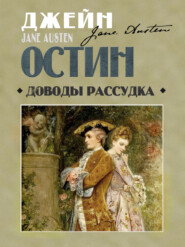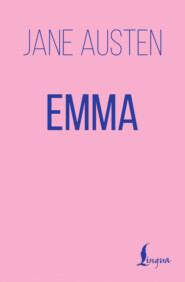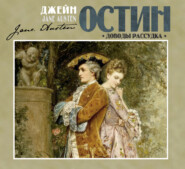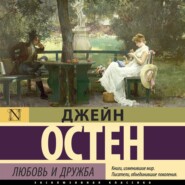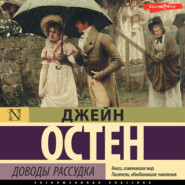По всем вопросам обращайтесь на: info@litportal.ru
(©) 2003-2024.
✖
Collins Classics
Автор
Год написания книги
2019
Настройки чтения
Размер шрифта
Высота строк
Поля
Her seduction was quite determined on. Her situation in every way called for it. She was his rival in Lady Denham’s favour; she was young, lovely and dependent. He had very early seen the necessity of the case, and had now been long trying with cautious assiduity to make an impression on her heart and to undermine her principles. Clara saw through him and had not the least intention of being seduced; but she bore with him patiently enough to confirm the sort of attachment which her personal charms had raised. A greater degree of discouragement indeed would not have affected Sir Edward. He was armed against the highest pitch of disdain or aversion. If she could not be won by affection, he must carry her off. He knew his business. Already had he had many musings on the subject. If he were constrained so to act, he must naturally wish to strike out something new, to exceed those who had gone before him; and he felt a strong curiosity to ascertain whether the neighbourhood of Timbuctoo might not afford some solitary house adapted for Clara’s reception. But the expense, alas! of measures in that masterly style was ill-suited to his purse; and prudence obliged him to prefer the quietest sort of ruin and disgrace for the object of his affections to the more renowned.
CHAPTER 9 (#ulink_a950e895-1af4-5dd8-ada9-495ced0a87c8)
One day, soon after Charlotte’s arrival at Sanditon, she had the pleasure of seeing, just as she ascended from the sands to the Terrace, a gentleman’s carriage with post horses standing at the door of the hotel, as very lately arrived and by the quantity of luggage being taken off, bringing, it might be hoped, some respectable family determined on a long residence.
Delighted to have such good news for Mr. and Mrs. Parker, who had both gone home some time before, she proceeded to Trafalgar House with as much alacrity as could remain after having contended for the last two hours with a very fine wind blowing directly on shore. But she had not reached the little lawn when she saw a lady walking nimbly behind her at no great distance; and convinced that it could be no acquaintance of her own, she resolved to hurry on and get into the house if possible before her. But the stranger’s pace did not allow this to be accomplished. Charlotte was on the steps and had rung, but the door was not opened, when the other crossed the lawn—and when the servant appeared, they were just equally ready for entering the house.
The ease of the lady, her “How do you do, Morgan?” and Morgan’s looks on seeing her, were a moment’s astonishment; but another moment brought Mr. Parker into the hall to welcome the sister he had seen from the drawing room; and Charlotte was soon introduced to Miss Diana Parker. There was a great deal of surprise but still more pleasure in seeing her. Nothing could be kinder than her reception from both husband and wife. How did she come? And with whom? And they were so glad to find her equal to the journey! And that she was to belong to them was taken as a thing of course.
Miss Diana Parker was about four and thirty, of middling height and slender; delicate looking rather than sickly; with an agreeable face and a very animated eye; her manners resembling her brother’s in their ease and frankness, though with more decision and less mildness in her tone. She began an account of herself without delay. Thanking them for their invitation but “that was quite out of the question for, they were all three come and meant to get into lodgings and make some stay.”
“All three come! What! Susan and Arthur! Susan able to come too! This is better and better.”
“Yes, we are actually all come. Quite unavoidable. Nothing else to be done. You shall hear all about it. But my dear Mary, send for the children, I long to see them.”
“And how has Susan born the journey? And how is Arthur? And why do we not see him here with you?”
“Susan has born it wonderfully. She had not a wink of sleep either the night before we set out or last night at Chichester, and as this is not so common with her as with me, I have had a thousand fears for her. But she has kept up wonderfully—no hysterics of consequence till we came within sight of poor old Sanditon and the attack was not very violent—nearly over by the time we reached your hotel so that we got her out of the carriage extremely well, with only Mr. Woodcock’s assistance. And when I left her she was directing the disposal of the luggage and helping old Sam uncord the trunks. She desired her best love with a thousand regrets at being so poor a creature that she could not come with me. And as for poor Arthur, he would not have been unwilling himself, but there is so much wind that I did not think he could safely venture for I am sure there is lumbago hanging about him; and so I helped him on with his great coat and sent him off to the Terrace to take us lodgings. Miss Heywood must have seen our carriage standing at the hotel. I knew Miss Heywood the moment I saw her before me on the down. My dear Tom, I am so glad to see you walk so well. Let me feel your ankle. That’s right; all right and clean. The play of your sinews a very little affected, barely perceptible. Well, now for the explanation of my being here. I told you in my letter of the two considerable families I was hoping to secure for you, the West Indians and the seminary.”
Here Mr. Parker drew his chair still nearer to his sister and took her hand again most affectionately as he answered, “Yes, yes, how active and how kind you have been!”
“The West Indians,” she continued, “whom I look upon as the most desirable of the two, as the best of the good, prove to be a Mrs. Griffiths and her family. I know them only through others. You must have heard me mention Miss Capper, the particular friend of my very particular friend Fanny Noyce. Now, Miss Capper is extremely intimate with a Mrs. Darling, who is on terms of constant correspondence with Mrs. Griffiths herself. Only a short chain, you see, between us, and not a link wanting. Mrs. Griffiths meant to go to the sea for her young people’s benefit, had fixed on the coast of Sussex, but was undecided as to the where, wanted something private, and wrote to ask the opinion of her friend, Mrs. Darling. Miss Capper happened to be staying with Mrs. Darling when Mrs. Griffiths’ letter arrived and was consulted on the question. She wrote the same day to Fanny Noyce and mentioned it to her; and Fanny, all alive for us, instantly took up her pen and forwarded the circumstance to me, except as to names—which have but lately transpired. There was but one thing for me to do. I answered Fanny’s letter by the same post and pressed for the recommendation of Sanditon. Fanny had feared your having no house large enough to receive such a family. But I seem to be spinning out my story to an endless length. You see how it was all managed. I had the pleasure of hearing soon afterwards, by the same simple link of connection, that Sanditon had been recommended by Mrs. Darling, and that the West Indians were very much disposed to go thither. This was the state of the case when I wrote to you. But two days ago—yes, the day before yesterday—I heard again from Fanny Noyce, saying that she had heard from Miss Capper, who by a letter from Mrs. Darling understood that Mrs. Griffiths had expressed herself in a letter to Mrs. Darling more doubtingly on the subject of Sanditon. Am I clear? I would be anything rather than not clear.”
“Oh, perfectly, perfectly. Well?”
“The reason of this hesitation was her having no connections in the place, and no means of ascertaining that she should have good accommodations on arriving there; and she was particularly careful and scrupulous on all those matters, more on account of a certain Miss Lambe, a young lady—probably a niece—under her care, than on her own account, or her daughters’. Miss Lambe has an immense fortune, richer than all the rest, and very delicate health. One sees clearly enough by all this the sort of woman Mrs. Griffiths must be: as helpless and indolent as wealth and a hot climate are apt to make us. But we are not born to equal energy. What was to be done? I had a few moments’ indecision, whether to offer to write to you, or to Mrs. Whitby, to secure them a house; but neither pleased me. I hate to employ others when I am equal to act myself; and my conscience told me that this was an occasion which called for me. Here was a family of helpless invalids whom I might essentially serve. I sounded Susan. The same thought had occurred to her. Arthur made no difficulties. Our plan was arranged immediately, we were off yesterday morning at six, left Chichester at the same hour today, and here we are.”
“Excellent! Excellent!” cried Mr. Parker. “Diana, you are unequalled in serving your friends and doing good to all the world. I know nobody like you. Mary, my love, is not she a wonderful creature? Well, and now, what house do you design to engage for them? What is the size of their family?”
“I do not at all know,” replied his sister, “have not the least idea, never heard any particulars; but I am very sure that the largest house at Sanditon cannot be too large. They are more likely to want a second. I shall take only one, however, and that but for a week certain. Miss Heywood, I astonish you. You hardly know what to make of me. I see by your looks that you are not used to such quick measures.”
The words “Unaccountable officiousness!—Activity run mad!” had just passed through Charlotte’s mind, but a civil answer was easy.
“I dare say I do look surprised,” said she, “because these are very great exertions, and I know what invalids both you and your sister are.”
“Invalids indeed. I trust there are not three people in England who have so sad a right to that appellation! But my dear Miss Heywood, we are sent into this world to be as extensively useful as possible, and where some degree of strength of mind is given, it is not a feeble body which will excuse us or incline us to excuse ourselves. The world is pretty much divided between the weak of mind and the strong; between those who can act and those who cannot; and it is the bounden duty of the capable to let no opportunity of being useful escape them. My sister’s complaints and mine are happily not often of a nature to threaten existence immediately. And as long as we can exert ourselves to be of use to others, I am convinced that the body is the better for the refreshment the mind receives in doing its duty. While I have been travelling with this object in view, I have been perfectly well.”
The entrance of the children ended this little panegyric on her own disposition; and after having noticed and caressed them all, she prepared to go.
“Cannot you dine with us? Is not it possible to prevail on you to dine with us?” was then the cry. And that being absolutely negatived, it was, “And when shall we see you again? And how can we be of use to you?” And Mr. Parker warmly offered his assistance in taking the house for Mrs. Griffiths.
“I will come to you the moment I have dined,” said he, “and we will go about together.”
But this was immediately declined.
“No, my dear Tom, upon no account in the world shall you stir a step on any business of mine. Your ankle wants rest. I see by the position of your foot that you have used it too much already. No, I shall go about my house-taking directly. Our dinner is not ordered till six; and by that time I hope to have completed it. It is now only half past four. As to seeing me
Вы ознакомились с фрагментом книги.
Приобретайте полный текст книги у нашего партнера:
Приобретайте полный текст книги у нашего партнера:






